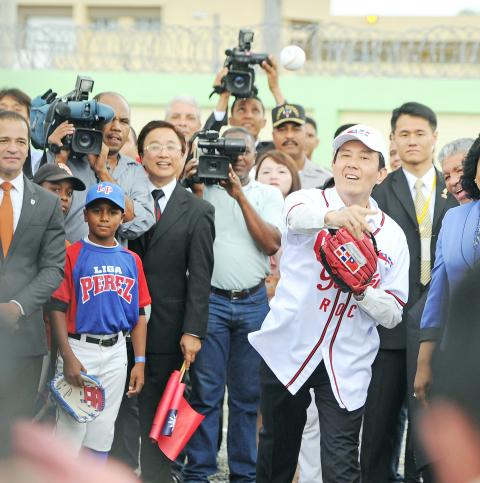Taiwan and China have found a model for peaceful coexistence — namely, the so-called “1992 consensus,” or “one China, different interpretations,” President Ma Ying-jeou (馬英九) said on two separate occasions in Boston on Saturday.
Addressing a banquet in honor of Taiwanese expatriates in the US, Ma said that the concept of the “1992 consensus” was proposed by Taiwan and accepted by China.
Some people have described the policy as a “masterpiece of ambiguity,” he said.

Photo: CNA
Regardless of whether it is ambiguous, the consensus has helped the two sides of the Taiwan Strait set aside their sovereignty disputes and pool their efforts for mutual benefit, Ma said.
The “1992 consensus” — a term former Mainland Affairs Council chairman Su Chi (蘇起) admitted making up in 2000 — refers to a tacit understanding between the Chinese Nationalist Party (KMT) and the Chinese government that both sides acknowledge there is “one China,” with each side having its own interpretation of what “China” means.
To promote peace, Ma said that since he took office, he has been promoting cross-strait relations, and trade and tourism exchanges have reached their highest point in 66 years.
Exchanges between the two sides are helpful for both sides, the president said, adding that he hopes they can continue exchanges and interactions based on the principle of the “1992 consensus.”
During the banquet, Ma also thanked the Massachusetts State House for its concern over burns victims from the June 27 explosion and fire at the Formosa Fun Coast water park in New Taipei City.
Ma also spoke at a seminar at Harvard University, with students, teachers, as well as US academics familiar with Taiwanese affairs attending.
The president reiterated his administration’s commitment to the “status quo,” his “three noes” policy of “no unification, no independence and no use of force,” and peaceful and prosperous cross-strait relations based on the Republic of China’s Constitution and the “1992 consensus.”
Up to 80 percent of the Taiwanese public supports maintaining the “status quo,” an indication that they hope to maintain peaceful and prosperous cross-strait relations created by his administration over the past seven years, Ma was reported as saying.
New York University School of Law professor Jerome Cohen reportedly proposed that Ma be nominated for the Nobel Peace Prize for his initiatives to resolve disputes in the East and South China seas.
Cohen made his proposal during the question-and-answer session after Ma’s speech, saying that he expects Ma to provide more proactive measures to promote peace on Itu Aba (Taiping Island, 太平島) in the South China Sea, according to a person who attended the seminar.
Itu Aba is the biggest Taiwan-controlled island in the contested and resource-rich South China Sea region, which is claimed either entirely or in part by Taiwan, Brunei, China, Malaysia, Vietnam and the Philippines.
Ma touted the benefits of a fisheries’ agreement signed in 2013 between Taiwan and Japan to address fishing disputes in waters surrounding the disputed Diaoyutai Islands (釣魚台) after his East China Sea peace initiative — which calls for shelving disputes and seeking joint development of resources — was proposed.
Ma said his proposal was based on the idea that “while national sovereignty cannot be divided or compromised, natural resources can be shared,” according to the attendee.
Ma arrived in Boston earlier that day en route to the Caribbean and Central America as part of his 11th overseas visit since assuming office in 2008.

Taiwan is stepping up plans to create self-sufficient supply chains for combat drones and increase foreign orders from the US to counter China’s numerical superiority, a defense official said on Saturday. Commenting on condition of anonymity, the official said the nation’s armed forces are in agreement with US Admiral Samuel Paparo’s assessment that Taiwan’s military must be prepared to turn the nation’s waters into a “hellscape” for the Chinese People’s Liberation Army (PLA). Paparo, the commander of the US Indo-Pacific Command, reiterated the concept during a Congressional hearing in Washington on Wednesday. He first coined the term in a security conference last

Prosecutors today declined to say who was questioned regarding alleged forgery on petitions to recall Democratic Progressive Party (DPP) legislators, after Chinese-language media earlier reported that members of the Chinese Nationalist Party (KMT) Youth League were brought in for questioning. The Ministry of Justice Investigation Bureau confirmed that two people had been questioned, but did not disclose any further information about the ongoing investigation. KMT Youth League members Lee Hsiao-liang (李孝亮) and Liu Szu-yin (劉思吟) — who are leading the effort to recall DPP caucus chief executive Rosalia Wu (吳思瑤) and Legislator Wu Pei-yi (吳沛憶) — both posted on Facebook saying: “I

Sung Chien-liang (宋建樑), who led efforts to recall Democratic Progressive Party (DPP) Legislator Lee Kun-cheng (李坤城), was released on bail of NT$80,000 today amid outcry over his decision to wear a Nazi armband to questioning the night before. Sung arrived at the New Taipei District Prosecutors’ Office for questioning in a recall petition forgery case last night wearing a red armband bearing a swastika, carrying a copy of Adolf Hitler’s Mein Kampf and giving a Nazi salute. Sung left the building at 1:15am without the armband and covering the book with his coat. Lee said today that this is a serious

The Ministry of Economic Affairs has fined Taobao NT$1.2 million (US$36,912) for advertisements that exceed its approved business scope, requiring the Chinese e-commerce platform to make corrections in the first half of this year or its license may be revoked. Lawmakers have called for stricter enforcement of Chinese e-commerce platforms and measures to prevent China from laundering its goods through Taiwan in response to US President Donald Trump’s heavy tariffs on China. The Legislative Yuan’s Finance Committee met today to discuss policies to prevent China from dumping goods in Taiwan, inviting government agencies to report. Democratic Progressive Party Legislator Kuo Kuo-wen (郭國文) said